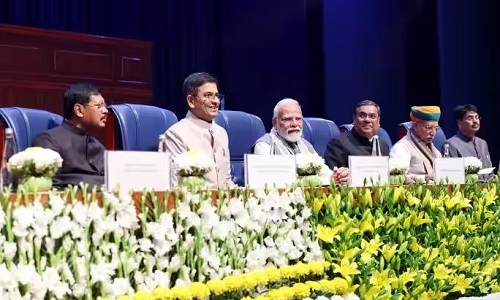Independent judiciary means independence of judges in performing their duties: CJI
29 Jan 2024 11:19:52

NEW DELHI,
CHIEF Justice of India D Y Chandrachud on Sunday said an independent judiciary does not merely mean its insulation from the executive and the legislature but also the independence of individual judges in performing their duties. He was speaking while heading a ceremonial bench at the Supreme Court to commemorate the court’s 75 years. The bench comprised judges of the court and those who attended its proceedings included lawyers and former apex court judges. The Chief Justice of India (CJI) said that “the Constitution entrenches several institutional safeguards for an independent judiciary such as a fixed retirement age and a bar against the alteration of salary of judges after their appointment”. “However, these constitutional safeguards are not in themselves sufficient to ensure an independent judiciary. An independent judiciary does not merely mean the insulation of the institution from the executive and the legislature branches but also the independence of individual judges in the performance of their roles as judges,” he said.
The art of judging must be free of social and political pressure, and from the inherent biases which human beings hold, CJI Chandrachud said. “Efforts are being made from within the institution to educate and sensitise judges across courts to unlearn their subconscious attitudes inculcated by social conditioning on gender, disability, race, caste and sexuality,” he said. The CJI said that despite changes in the world, the principles highlighted during the inaugural sitting of this court on January 28, 1950, continue to remain relevant today to the functioning of an independent Supreme Court. “This court has in the last 75 years faced old and new challenges in confronting the face of injustice and meeting the expectations of those at the receiving end of power. This court has through the course of many years charted its understanding of principles and developed innovative approaches to achieve the ideals of a democratic polity governed by the rule of law under a written Constitution,” he said.
CJI Chandrachud added that January 28 marks a significant day in constitutional history as the inaugural sitting of the Supreme Court was held on this day 75 years ago. “Six judges of the federal court led by Chief Justice Harilal J Kania assembled for the first sitting of the Supreme Court of India. The event took place without much fanfare in the Prince’s Chamber of the building of Parliament from which the federal court functioned,” he said. He added that the chief justice’s address at the inaugural sitting emphasised three principles which are necessary for the Supreme Court to function according to the constitutional mandate.